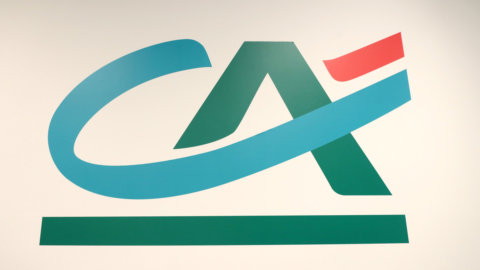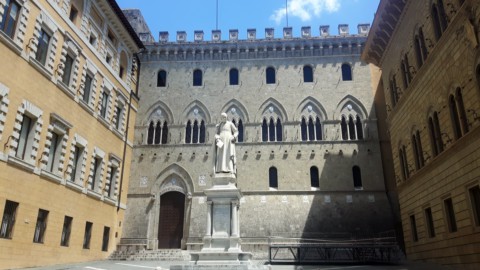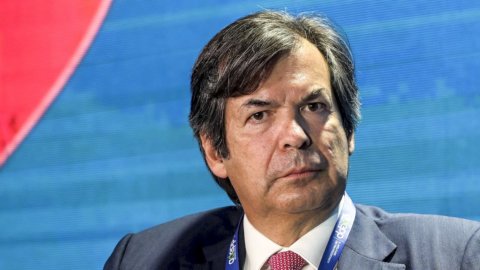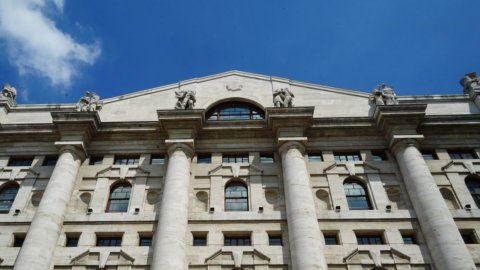The week starts with a save. The central bank of Portugal has decided to invest 4,9 billion euros to purchase the assets of Banco Espirito Santo to allocate them to the creation of Novo Banco. In a second moment, explained the governor Carlos Costa, the Novo Banco will be put up for sale and the proceeds will be used to compensate the state.
Lisbon has invested, with the full backing of the ECB, part of the money (6,6 billion) left over from EU and IMF aid. “It will be the shareholders, junior bondholders and managers of Espirito Santo and not the taxpayers who will shoulder the losses due to their lack of supervision”. The most problematic holdings of Espirito Santo will thus remain in the old bank controlled by the current shareholders.
This removes one of the threats to markets that contributed to a mixed August flight.
Uncertainty, however, dominates: Tokyo and Hong Kong post modest gains despite good US employment data on Friday. Better Shanghai +1,14% even if the central bank has announced that it will reduce the volume of credit after the massive injections of recent months.
THE EMBARGO TOWARDS MOSCOW WEIGHS ON THE EU
The markets thus reopen after a turbulent week which, in figures, can be summarized as follows: the S&P index has lost 2,7% in the last five sessions: this is the worst performance since June 2012.
In Europe, the Euro Stoxx index fell by 3,23%. Even worse is the Frankfurt Dax -4,5%, the market most sensitive to the embargo against Moscow. The Spanish Ibex was also down 3.44%. The slowdown in Piazza Affari was average: the Ftse Mb index fell by 3,33%. Volatility is also growing on Bonds.
The spread between Btp and Bund rose by 10 points to 162 bp. The yield of the Spanish Bonos rose to 2,56%, the differential with the German 143-year bond is 0,59 bp. The US two-year, after hitting a maximum yield of 0,48% on Thursday, closed the week at 1,11%. The 1,14-year German bund fell as low as 3% on Thursday amid mounting Russia embargo fears before recovering as much as 1% in late trading. On the positive note, on Saturday Moody's raised Greece's credit rating by two notches, from CaaXNUMX to CaaXNUMX. The outlook is stable
BAG IN THE HANDS OF DRAGONS AND ITALIAN GDP
Argentina, the crisis in Gaza, the anti-Russian sanctions and last but not least the bank fines inflicted by the US authorities (France will raise the question at the G20) are at the origin of the anxiety that reigns on the markets. But these turmoil can be managed if it remains contained while the main engines, governed by central bank action, continue to function.
Hence the importance of the Fed's choices and the indications that will come from the ECB directorate on August 7, the key event of the week.
1) The therapies of the ECB produce the first effects on the euro front, finally declining against the dollar. But the nightmare of deflation hangs ever more over the fate of the eurozone, judging by the dynamics of prices. Especially for the suburbs. Given the premises, it is not difficult to predict that the next meeting of the central bank in Frankfurt, scheduled for Thursday 7, will be played out on two issues: waiting for the start of Tltro purchases scheduled for mid-September, precious oxygen for the system banking; the increasingly pressing demand for quantitative easing in the Old Continent by the end of the year, capable of compensating for the end of the Fed's operations. The markets will pay close attention to every nuance of Mario Draghi's tone to understand who, among the hawks and doves, is prevailing in this phase, distinct from geopolitical turmoil.
2) Looking at the USA, and some had doubts about the importance of exceptionally low rates in the recent stock market rally, the events of the past week should have dispelled them, at least in part. US stock markets reacted with great nervousness to signs of strengthening of the economic situation, from the exceptionally favorable figure for GDP in the second quarter (+4%) to the good figure for the manufacturing sector released on Friday afternoon. On the contrary, the stock market took a breather with the labor market report for July, which was less positive than expected: 209.000 new jobs but unemployment up slightly by 0.1% to 6.2%, and hourly wages unchanged, confirming that underemployment is still relevant. Few data collected in the coming days: tomorrow the non-manufacturing ISM, the trade balance on Wednesday 6th and data on non-agricultural productivity on Friday 8th August.
3) Among the most relevant macro data of the week, the Istat survey of Italian GDP for the second half of the year stands out, scheduled for Wednesday 6. No one is having any particular illusions: Once a clear cut from government estimates is taken for granted (+0,8% for the whole of 2014) the fear is that the needle for GDP remained below or equal to zero between April and June.
ARGENTINA, THE CDS START. DISCOUNT RISK FOR ARGENTINA TELECOM
Negotiations between Buenos Aires and the hedge creditors resume, amidst a thousand obstacles. In the meantime, however, payments are taking place on the CDS, i.e. the policies against bankruptcy underwritten by the large speculative funds. According to the International Swaps and Derivatives Association, the default triggered requests for repayments of one billion dollars; is the alarm raised by Citigroup, one of the banks that hold debt securities on behalf of Buenos Aires. It is the tip of the iceberg of the mass of outstanding derivative contracts on Argentina amounting to at least 20 billion dollars (but net of hedging transactions the figure drops to just over one billion). The payment of the CDS has caused Argentina to rise up. The Buenos Aires government speaks of a maneuver to encourage speculation by accusing New York judge Thomas Griesa of subjecting "the country to extortion" and asking for the removal of mediator Daniel Pollack. “Argentina – Griesa replied – must stop telling half-truths about the debt crisis”.
The default effect also affects the sale of Telecom Argentina. The closing of the sale of the Telecom Italia subsidiary to Fintech, already scheduled for Tuesday 12 August for 960 million dollars, could be postponed. The dossier will be examined by the board led by Marco Patuano tomorrow 5 August.
FIAT, THE ANTI-WITHDRAWAL MISSION STARTS WITH THE HELP OF THE CHINESE SHAREHOLDER
After Friday's historic shareholders' meeting, Fiat faces the examination of the markets, with more than one novelty, including the entry of the Chinese central bank into the shareholding structure with a 2% share.
First of all, the merger operation was approved by just over 84% of the capital present at the meeting. Those against were just over 8%, or more than a third of the institutional investors present. Had it been for them, therefore, the objective of a majority of more than two thirds necessary would not have been achieved. The attitude of some proxy fighters was decisive, starting with ISS, who advised against voting in protest against the changes to the majority's right to vote. In the new FCA Exor, which controls 30,4%, will be able to vote for 46,2%.
In the event that these votes against were to result in requests for withdrawal at the envisaged price (7,727 euros), the limit of 500 million allocated by Fiat to pay outgoing shareholders would be exceeded: the amount would in fact exceed 700 million. That is, the merger would fail. Or maybe not because, according to the regulation, the shares subject to withdrawal will have the preemption of the other shareholders who could proceed with new purchases.
In summary, whoever withdraws (last date 20 August) will collect 7,727 euros per share, against a price of 7,111 on Friday, but will do so without knowing the results for the third quarter. In the event of a stock rebound, the deal could be done by the buyer.
PIRELLI, 100% MTP ANKLE BOOTS
The complex architecture of the new Pirelli control is completed. Marco Trochetti Provra has acquired the minority shares of the Rovati family (protagonist of the sale of Rottapharm) and of Sigieri Diaz Pallavicini's Gwm. The two families increase their stakes in Nuove Partecipazioni, the company that will control 76% of Coinv, the new company that will own 50% of Camfin (the other half is owned by the Russian Rosneft).
In essence, Nuove Partecipazioni will be 52% controlled by Mtp, the rest by a club of allies of the president of Bicocca: the Rovatis, Gwm, the Acutis family, Massimo Moratti (with 6,2%) and Alberto Pirelli (the 6%).
Camfin, controlled by the Italian pool and by Rosnefet, controls 26,2% of Pirelli.
INTESA LEADS THE RECOVERY AFTER ESPIRITO SANTO
The sector is trying to absorb the last aftermath of the shock Banco Espirito Santo, which has slipped by another 40% to a capitalization of 675 million (against 8 billion at the beginning of June).
Intesa shone in Piazza Affari on Friday, earning 1,26% to 2,258 euros after surprising the market with 217 million euros of profit in the second quarter of the year and a Core Tier 1 ratio of 12,9%, top level among the major European banks. The CEO of the bank, Carlo Messina, declared that he had "strong confidence" in the asset quality review and in this regard clarified that he was not able to evaluate whether or not to change the dividend policy until it is clear what will be the real capital threshold set for large banks.





